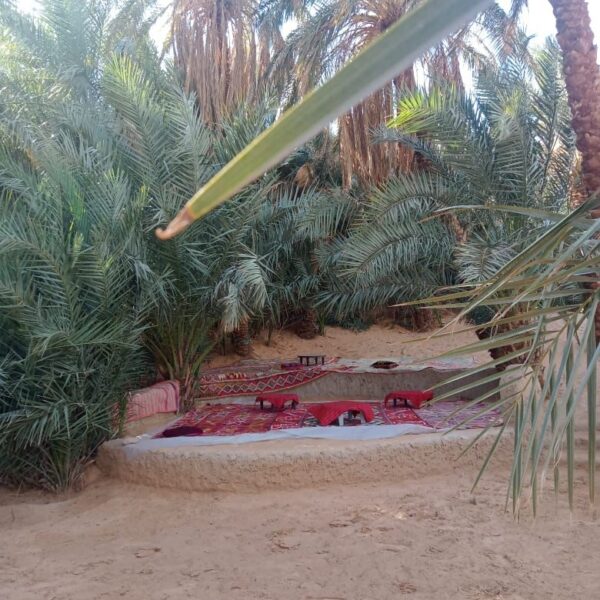I met Abdeslam Abdelhak in February 2012 thanks to a mutual friend. A former journalist, he took me that morning for my first crossing of Oran, once the most European city in Algeria, particularly known for its large Spanish community, which diminished after Independence. It was during lunch that he shared the following story with me:
One day in September 2006, we received a group of eighty pieds noirs, mainly from Saïda, 170 km south of Oran, a small town at the beginning of the High Plateau, who had set out to visit the places of their youth. Tourists in Algeria, then! It had been a long time since we had seen that!
The group arrived around five o'clock at the Es Sénia airport. We operate with buses of twenty people, with four guides, and as soon as they take their seats, we head towards Saïda where they are awaited.
During the journey of just over 3 hours, the atmosphere is tense; they left the country about fifty years ago, under dramatic conditions, after a war that lasted seven years, and they are returning after a long period of terrorism, the 90s, the Black Decade. The media did their job on the other side of the Mediterranean, and they fear being victims of attacks. Not to mention Benedict XVI, who has just been elected Pope and made statements about violence in Islam. The Muslim street began to rumble, there were even demonstrations in Egypt, and of course our Algerian extremists rode the wave to stir up hatred.
We still arrive in Saïda, and ultimately everything goes well; at the hotel, a welcoming committee awaits them, including some former residents of Saïda who come to greet them. Some find a friend, an acquaintance. From the first day, we have about ten Muslims who are always in the group, accompanying the pieds noirs to go shopping, inviting them to their homes for couscous, and following all our activities.
On the third day, we go to visit old Saïda. It is mid-September, on the High Plateau, the sun has done its job all summer, the landscape is lunar except for a ravine that opens right by the roadside. This ravine is a little paradise. A stream flows at the bottom and gives rise to lush greenery, gigantic trees, grass, and flowers. The forest rangers have even set up a small zoo, there are macaques, gazelles.
We stroll in this cool place, and at a certain moment during a break, a small group of about half a dozen people separates and climbs the other side of the ravine. The group is led by a lady whom no one had noticed before. In a group, there are those who stand out and those who make discretion a way of life, who sit at the back of the bus, who pass by unnoticed. She belonged to this category.
She climbs the slope, stops, turns around, and speaks. At that moment, she becomes remarkable. She has a voice that carries, and the hundred people present hear her very well, especially as she develops a speech that grips us.
Here’s what she says: I am not from Saïda, and this is my first time in Algeria. But my husband was from Saïda. He was Jewish and also a postman, which allowed him to cross all communities—Christian, Jewish, Muslim—and he had friends everywhere because he was a cheerful guy. If I am here today, it is because Edmond, my husband, made me promise on his deathbed to come spread his ashes here.
She holds an urn in her hands. We are taken aback; there are even women with tears in their eyes. She continues: This is not a day of sadness; on the contrary, because Edmond was a cheerful guy, he would have liked it to happen in joy, especially since today he will have the happiness of returning to his homeland.
She opens the urn, and among this group of eighty people, there are about twenty who are of Jewish faith, and they start to sing a tune, but just the tune without the words. It is the Kaddish, the prayer for the dead. This tune accompanies the lady until she finishes spreading the ashes.
When she is done, she begins to descend the slope, and at that moment, three, four, ten, then very quickly about fifty voices rise. These are the Christians in the group, who begin to sing. They hum a tune. I later learned that it was the Ode to Joy, but just the tune without the words, until she reaches the bottom of the ravine and rejoins the group.
At that moment, a small fraction of eternity of silence passes between us. We are all frozen. And then one of the old Muslims, who had been with us the whole time, calls out to us and says: and what about us, my brothers, we Muslims, don’t we know how to bury our dead? Let’s go, the Fetiah! And we all recited the first surah of the Quran in homage to this lady’s husband.
François Beaune is a writer, currently living in Marseille. He has made numerous journeys in the Mediterranean to collect a whole set of "True Stories," some of which have been published in "The Moon in the Well," (Verticales editions, 2013, and in Folio Gallimard, in 2017). He has just published his latest novel "The Depth of Water," with Albin Michel editions, in January 2025, under the common pseudonym with the heroine Jessica Martin.

Cover Photo: An oasis in Timimoun, Algeria © Tarik Hafid
